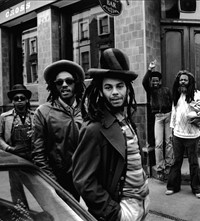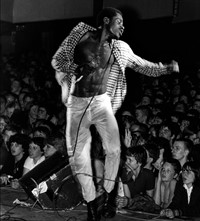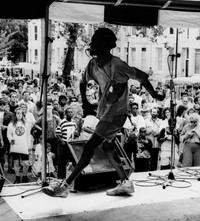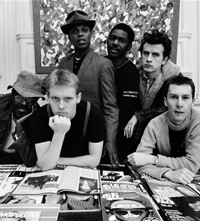A new exhibition spotlights how Jamaican music helped shape modern Britain
- TextBenjamin Hammond
In 1948, hundreds of Caribbeans embarked on a journey to the UK, leaving their homeland behind. Invited to help rebuild Britain post World War II, the Windrush generation would come to have a profound and positive impact on their new home. Bass Culture 70/50 – a new, four-week exhibition – explores this impact, specifically the ways Jamaican music has helped shape the UK.
On display at Ambika P3 gallery in London, the show marks 70 years since the arrival of Empire Windrush at Tilbury Dock, Essex, and 50 years since the advent of British reggae. It features a series of photographs and films of the black musicians who over the years have come to inform Jamaican-inspired genres such as dub, jungle and grime.
In light of the Windrush scandal, the exhibition’s approach offers a refreshing perspective, illustrating the generation’s cultural significance. Following increased discrimination the University of Westminster’s Black Music Research Unit actively fights against the marginalisation of people of colour. “It’s important that the positive impact of Jamaican music and culture is celebrated, rather than the negative perceptions of Jamaicans in the UK,” explains British music photographer and curator, Adrian Boot. “They’ve done much more than just man the buses and staff our health services – they’ve remodelled our cultural landscape.”
Boot’s documentative imagery timelessly captures the people who transformed the UK’s music scene. Having inspired a whole new wave of genres, Jamaicans gave birth to the likes of dancehall, ska and grime, all of which are a response to reggae. Upon their arrival to Britain, the Windrush generation were greeted by the nationwide sound of rock and roll. With many feeling nostalgic for their home culture, Don Letts launched Trojan Records, the first label to bring Jamaican sound into British popular music. Having pictured the likes of The Specials and Steel Pulse, Boot’s presentation of these prominent figures demonstrates more than just their musical reach – as the photographer suggests, “Their impact isn’t just in music but also in fashion, style and language.”
The 70-year retrospective sheds a light on the undeniable influence Jamaican culture has had in shaping modern Britain – and that’s the whole point. “I hope [visitors] are reminded of the huge contribution Jamaica has made to the UK,” says Boot. “Prior to this the UK was a cultural backwater. Jamaicans in the UK should be proud.”
Bass Culture 70/50 is on view at Ambika P3, London, through November 23, 2018.















